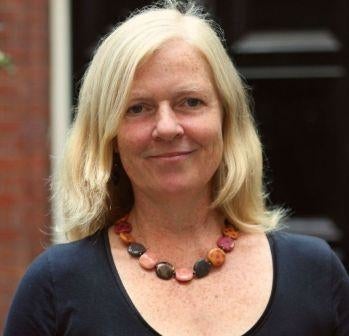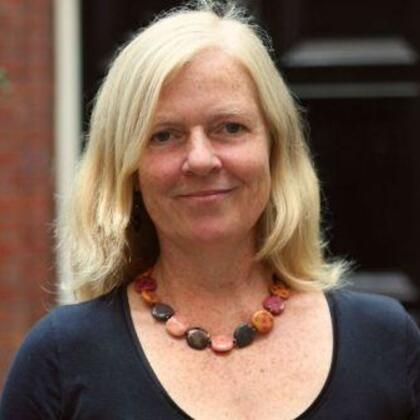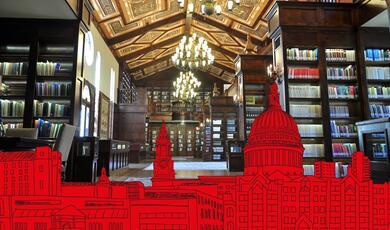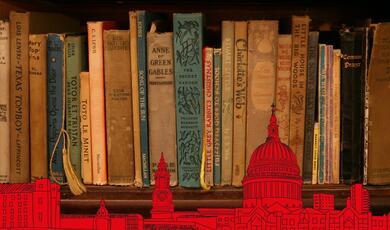Theatre and Love: Tom Stoppard, 'The Real Thing'
Share
- Details
- Text
- Audio
- Downloads
- Extra Reading
It would be churlish to finish a series of lectures on the mysteries of reading, and writing without mention of one of literature's central concerns - to understand love. Stoppard's The Real Thing was first performed in 1982. It is a play within a play and explores, among other things, the relationship between semblance and reality, artifice and truth, hence the title. But it is also about language and the writer's difficulty articulating love. The hero is a playwright who writes television scripts effortlessly and is decently remunerated. But he struggles to write a play about his love for Annie, the woman he falls for, and which leads to his divorce from his wife to whom he has to pay substantial alimony. How does the idea of the impossibility of expressing love relate to the play as a whole?
Download Text
10 May 2016
Theatre and Love:
Tom Stoppard, The Real Thing
Professor Belinda Jack
Good evening and welcome. Thank you for coming.
Here is a mischievous photo of Sir Tom Stoppard. And here is a short clip of the Monkees, one of the bands that Henry – the playwright in the play we’re thinking about tonight – is fond of. To some extent this represents Henry’s youth and perhaps suggests that at the beginning of the play at least, he has not really grown up and shows little self-perspective. This has changed by the end of the play. And after the lecture we’ll hear some Pink Floyd, Darkside of the Moon, the inspiration for Stoppard’s radio play, ‘Darkside’ (2013).
Tom Stoppard has been producing drama, fiction and screenplays for more than fifty years. And The Real Thing was first performed almost thirty-five years ago, in 1982. So why have I chosen this play as the subject of my final lecture – my eighteenth – in the series ‘The Mysteries of Reading and Writing’? (I will, however, be lecturing for a further year, beginning in October with Jane Austen’s Persuasion.)
Firstly, I wanted to consider ‘love’, a subject at the heart of so many literary works. Think of Shakespeare’s plays – or the great works of fiction of the nineteenth century. In addition, Stoppard’s play celebrates ambiguities and it is this quality which is shared by all the greatest works of literature. And in Stoppard, ambiguity functions in every aspect of the play’s theatricality, including its structure.
As Stoppard critic Toby Zinman writes, Stoppard’s ‘drama is fast-paced rather than leisurely, complex rather than spare, dialectical rather than linear…’ ‘The “faux” opening scene’ is ‘taken by the audience to be true; a doubled, trebled or quadrupled structure; and a set that functions as part of the play’ mean that ‘the audience has constantly to assess and re-assess its ‘reading’ of the action as it progresses.’ (Cambridge Companion to Tom Stoppard p.16)
The title is as ambiguous as many aspects of the play; it refers to a consummate love, ‘the real thing’, not just a passing infatuation, but it also suggests ideas of ‘reality’ and ‘unreality’- what is ‘real’ and what is ‘unreal’? These two last concepts open up myriad possibilities in theatre which is not ‘the real thing’ – it is make-believe. This second sense of the title becomes quickly apparent in the second scene when the audience realises that the first scene was a rehearsal of a play, The House of Cards – within the play, The Real Thing; the first scene was not ‘the real thing’, it was a play. The title, The House of Cards, refers both to a real thing – a building-like structure (‘a house’), made out of stacked up playing cards. But a ‘house of cards’ is also an expression that dates back to 1645, meaning a literal or metaphorical structure (metaphorically, an argument, for example), built on an unreliable foundation, and therefore at risk of collapse, if one unnecessary or irrelevant element is removed. Marriages and relationships may well be no more than ‘houses of cards’, apparently impressive structures but on the verge of breakdown.
For all the make-believe, both the play within the play, and the play, bears all manner of interesting relationships with ‘the real’. In particular, the play explores the nature of love and marriage, aspects of human life from which Stoppard had hitherto kept his distance in his plays. In fact Stoppard had been repeatedly accused of emotional coldness and unnecessary intellectualism. As he himself said, “If I filed my cuttings… I would no doubt have a pretty thick too-clever-by-half envelope”’. (p.185). For a long time he also shied away from presenting human love. And yet theatre, like all literature, is frequently if not about love, then animated at least in part, by this fundamental human emotion. Stoppard came to see it a great topic: ‘Love is a very interesting subject to write about… I’ve been aware of the process that has lasted 25 years, of shedding inhibitions about self-revelation.’ (pp.185-6) Stoppard claimed that he was a ‘repressed exhibitionist’; ‘The older I get the less I care about self-concealment’. (p.19)
At the heart of the play is the relationship between Annie (‘30-ish’), a female actor who begins the play married to Max (‘40-ish’), a male actor who is performing in Henry's new play, House of Cards), and Henry (‘40-ish’), a playwright who, at the outset of the play, is married to Charlotte while conducting an affair with Annie. Annie is an actor with a cause: she is part of a group fighting for justice for Brodie, a twenty-five year old Scottish soldier who has been imprisoned for setting fire to a memorial wreath at the Tomb of the Unknown Warrior, during a protest against his army’s own missiles.
There are two additional, younger characters: Billy (‘22-ish’), an actor who plays Giovanni opposite Annie's Annabella in 'Tis Pity She's a Whore. Billy is obviously attracted to Annie; and Debbie, (Charlotte and Henry’s seventeen year old daughter), who is largely absent.
The Real Thing is a two act play set in contemporary London (1982). As I said in my last lecture in relation to Beckett’s Waiting for Godot, a two act play suggests repetition, rather than resolution. Beckett, not coincidentally, is much admired by Stoppard.
In the opening scene of the first act Max accuses his often absent wife of having an affair. She leaves the stage. In the second scene we are presented with a rather different Charlotte who is now married to Henry, a playwright. Gradually we realise that Charlotte is an actor and that her appearance in the first scene was in a performance of one of Henry’s plays. In that play (within the play), the character of Max is played by a man named Max, a long-term friend of Henry and Charlotte.
In the scene it becomes obvious that Charlotte is critical of the play because the female lead role is undeveloped. Charlotte believes that this is designed to allow the wit of the male lead to dominate.
Max and then his wife Annie drop in to visit Charlotte and Henry. The ‘real’ Max seems dull by comparison with Henry’s ‘Max’, the Max of his play. Annie, the committed activist is not taken seriously by Henry who claims, for example, that ‘public postures have the configuration of private derangement’ (Faber ed., p.179) and he describes Brodie as ‘an out-and-out thug, an arsonist, vandalizer of a national shrine, but mouldering in jail for years to come owing, perhaps, to society’s inability to comprehend a man divided against himself, a pacifist hooligan.’ (p.180) Max attempts, ineffectually, to defend Annie’s position, saying to Henry: ‘Brodie may be no intellectual, like you, but he did march for a cause, and now he’s got six years for a stupid piece of bravado and a punch-up, and he’d have been forgotten in a week if it wasn’t for Annie. That’s what life is about – messy bits of good and bad luck, and people caring and not necessarily having all the answers. Who the hell are you to patronize Annie? She’s worth ten of you.’ But the disagreements between Henry and Annie turn out to be a performance: they are actually having a clandestine affair and arrange to meet later when Annie will be allegedly visiting Brodie in prison.
And Act 1 ends with Henry’s declaration of love:
I love love. I love having a lover and being one. The insularity of passion. I love it. I love the way it blurs the distinction between everyone who isn’t one’s lover. Only two kinds of presence in the world. There’s you and there’s them. I love you so.
As in Beckett’s Waiting for Godot, the simplicity of the language allows for ambiguity. ‘I love you so’, could mean ‘so much’, or ‘in this manner’. And the recurrent question, ‘are you alright?’ which is repeated n times in the play, takes on different shades of meaning as Henry and Annie’s relationship becomes closer.
Act 2 begins ‘two years later’. As a result of his divorce, Henry has to raise significant amounts of money as alimony. To do this he has to write television scripts which Annie is critical of, and which Henry himself deems beneath him: ‘If Charlotte made it legal with that architect she’s shacked up with, I’d be writing the real stuff.’ (p.207). And the play Henry had said he’d write about Annie in Act 1 still hasn’t been written. Henry explains: “I just don’t know how to write love. I try to write it properly, and it just comes out embarrassing. It’s either childish or it’s rude. And the rude bits are absolutely juvenile. I can’t use any of it… Perhaps I should write it completely artificial. Blank verse. Poetic imagery. Not so much of the ‘Will you still love me when my tits are droopy?’ ‘Of course I will darling, it’s your bum I’m mad for’. And more of the ‘By my troth, thy beauty makest the moon hide her radiance’, do you think?” Annie bluntly replies, ‘Not really, no’, and Henry continues, ‘No. Not really. I don’t know. Loving and being loved is unilateral. It’s happiness expressed in banality and lust’. (p.188)
Annie has asked Henry to re-write a play written by Brodie, whom she continues to visit in prison. Brodie's anarchist politics, his anti-intellectualism, his disdain for - and ignorance of – all matters aesthetic, and his complete lack of writing ability are all the antitheses of Henry’s ideals. Annie defends Brodie’s writing on the basis of the passion that animates it. Henry appeals to the aesthetic dimension and defends the importance of beauty in language and proficiency in writing.
He likens the difference between Brodie’s writing and good writing using the comparison between a good cricket bat and a plank of wood. The second may be roughly the same shape as a cricket bat but it hasn’t been designed to have ‘spring’, the quality that allows a ball to be hit so far.
In Scene Six Annie is on a train travelling to Glasgow where she will act opposite Billy in ‘Tis Pity She’s a Whore. They bump into each other on the train and it becomes clear that Billy is strongly attracted to her in ‘real life’, as in the play.
In Scene Seven, Henry, Charlotte and Debbie have met for a family meeting to discuss Debbie’s plans to travel with a new boyfriend who is a fairground worker. Father and daughter discuss love. Henry, ‘It’s to do with knowing and being known… A sort of knowledge. Personal, final, uncompromised. Knowing, being known. I revere that.’ Debbie’s view of monogamy is rather different: ‘Exclusive rights isn’t love, it’s colonization.’ Henry replies, ‘Christ almighty. Another ersatz masterpiece. Like Michelangelo working in polystyrene.’ Henry gently cautions her against his own proclivity for using clever expressions for their own sake, but he is upset by her profound cynicism. Debbie leaves. Henry and Charlotte continue a similar conversation, and Henry expresses his lack of sympathy for Charlotte’s understanding of matters amorous. It turns out that Charlotte had a number of affairs while they were married. Henry’s understanding is more old-fashioned: ‘No commitments. Only bargains. The trouble is I don’t really believe it. I’d rather be an idiot. It’s a kind of idiocy I like. ‘I use you because you love me. I love you so use me. Be indulgent, negligent, preoccupied, premenstrual… your credit is infinite, I’m yours, I’m committed… It’s no trick loving somebody at their best. Love is loving them at their worst. Is that romantic? Well, good. Everything should be romantic. Love, work, music, literature, virginity, loss of virginity…’
The eighth scene acts as something of an interlude. The stage directions read: ‘In order to accommodate a scene change, Scene Eight was spoken twice, once as a ‘word rehearsal’ and then again as an ‘acting rehearsal’. The play in question is ‘Tis Pity She’s a Whore and the players are Billy and Annie.
When Annie returns home from Glasgow she discovers that Henry has ransacked the flat looking for signs of her infidelity. His confrontation with Annie echoes the scene from his play, The House of Cards but Annie has a good bit more to say than the wife of the play. Annie confesses that she is emotionally entangled with her co-star Billy, but claims it is not physical. She expresses her intention of maintaining relationships with both Billy and Henry: both relationships, she argues, have a moral dimension that she must respect. Henry must come to terms with the arrangement. He concedes. Her relationship with Billy appears to fizzle out but her relationship with Henry remains strained, then compounded by Brodie’s release from prison.
The climax comes in Scene Twelve, the final scene. Brodie’s political play, in part based on his own experiences that Henry had deemed second rate, has been re-written by him – on Annie’s insistence. Brodie visits them and proves to be an unpleasant piece of work.
He dislikes the work that Henry has done on his television play. This has worked but Brodie is full of resentment. He tells Henry, ‘I liked it better before. You don’t mind me saying.’ And a little later, ‘You had a go. You did your best. It probably needed something, to work in with their prejudices.’ Henry replies, already riled and in ironic mode: ‘Yes, they are a bit prejudiced, these drama producers. They don’t like plays that go ‘clunk’ every time someone opens his mouth. They gang up against soap-box bigots with no idea that everything has a length…’ Brodie replies: ‘Don’t be clever with me, Henry, like you were clever with my play. I lived it and put my guts into it, and you came along and wrote it clever. Not for me. For her. I’m not stupid.’ Brodie also makes various wholly inappropriate comments about Annie’s attractiveness. Crucially it also emerges that Annie’s friendship with Brodie is based on guilt. His act of arson was committed in an effort to impress Annie. But his behaviour becomes increasingly unacceptable and Annie throws him out of the house. Annie and Henry’s closeness resumes. The play ends with a phone call from Max, who tells Henry that he is newly engaged. It’s all too good to be true and the play ends with a touch of comic irony. This is no longer ‘the real thing’.
As Toby Zinman writes:
Stoppard… refuses to reduce to rationality the irrationality of romantic love… or to exclude the difficulties of morality and the enigmas of honour that make his politics so hard to label… That morality and honor so deeply concern him suggests a contemporary author who is distinctly not a post-modern one. (p.121)
I think that Stoppard’s refusal of post-modernity is manifest in his belief in art, his belief in language, and the capacity of art and language to be a potential force of good – in however small a way. This is visible in his linguistic twinnings, his puns, his use of foreign languages and invented language, in double entendres, and malapropisms.
And this respect for language is also perhaps articulated by Henry: ‘Maybe Brodie got a raw deal, maybe he didn’t. I don’t know. It doesn’t count. He’s a lout with language. I can’t help someone who thinks, or thinks he thinks, that editing a newspaper is censorship, or that throwing bricks is a demonstration while building tower blocks is a social violence, or that unpalatable statement is provocation while disrupting the speaker is the exercise of free speech… Words don’t deserve that kind of malarkey. They’re innocent, neutral, precise, standing for this, describing that, meaning the other, so if you look after them you can build bridges across incomprehension and chaos. But when they get their corners knocked off, they’re no good any more, and Brodie knocks corners off without knowing he’s doing it. So everything he builds is jerry-built. It’s rubbish. An intelligent child could push it over. I don’t think that writers are sacred, but words are. They deserve respect. If you get the right ones in the right order, you can nudge the world a little or make a poem which children will speak for you when you’re dead.’ (p.207)
But Stoppard’s refusal of post-modernity is not the flip side of naivety. Stoppard’s writings show, for example, his suspicion of a single or omniscient viewpoint. And no single viewpoint can be taken as the author’s. Stoppard has long demonstrated an unease with polemical and documentary playwriting as is seen in the attack on Brodie’s attempts to write agitprop theatre.
And this reservation about point of view is related to a philosophical position. As the Stoppard critic William Demastes writes (Narrative, Vol.19, No 2 (May 2011), pp. 229 – 240):
‘Physics… ceased being Newtonian and started being modern when Einstein found himself obliged to rule out the possibility of a viewpoint at rest’, all in an effort ‘to be precise over a greater range of events than Newtonian mechanics could accurately account for’. James [that is Clive James] insists that Stoppard’s plan is to move beyond the admittedly functional but restrictive Newtonian vision of universal order – which is the causal scheme underlying naturalist theatre – while avoiding absurdism’s iconoclastic embrace of anti-rationalist meaninglessness or randomness or disorder’. (pp. 229-30; end of quotation)
The ‘viewpoint’ which is never at rest is analogous to another Stoppardian conviction: that about the constant flux of the universe. In his prose work, Galileo, an unpublished screenplay (cited by William W. Demastes, ‘Portrait of an Artist as Proto-Chaotician: Tom Stoppard Working His Way to Arcadia), he wrote:
I do not understand why perfection should be a state of rest rather than a state of change. I am very fond of this earth. It is not of course perfect, but that which I find noble and admirable in it is all to do with change. The change of a bud to a flower, of a deer feeding to a deer running, the change of a grape to wine, child to man, wood to flame; and the ash is thrown on the soil to help the buds change to flowers again. Alteration, novelty, decay, regeneration – these are not the blemishes of the world. Who would want a crystal globe? What use is that to man created by God? (p234)
As Demastes goes on to say, ‘Objectivity is impossible given that everything must be filtered through the never-resting viewpoint of individual consciousnesses. We all develop ‘private derangements’… (p.235)
And the character of Moon, in Stoppard’s novel, Lord Malquist and Mr Moon, is an historian who describes his project as ‘not exactly the history [but] the patterns of it, getting at them, you see. I’m trying to collect all the things which have made things turn out the way they have today, to find out if there is a pattern’… What Moon aims to assemble is all the data previously collected by the traditional historians and organize it ‘into sequences and categories’ and then determine all the interconnections ‘so you can see where things cross and where they join up, so you can relate all the things to each other… so it might be possible to discover the grand design, find out if there is one, or if it’s all random.’ Moon is looking for a Grand Unification Theory, the pattern underneath the superficial disorder. But the weakness of his approach is that he looks too closely, hoping to find an order.
This quasi-philosophical conviction finds its counterpoint in the structural theatricality of The Real Thing:
Briefly, as the critic William W. Demastes describes:
He opens the play with a scene… sleight of hand, but this theatricality does so much more, presenting as it does a scene of love and betrayal that is intentionally ‘theatrical’. The dialogue is too clean and witty – not quite the real thing. Later we get a much sloppier… kind of confrontation between a ‘real’ couple in the play, but it too fails to satisfy, given that it feels like the stylized inarticulation of a method-acted kitchen sink play. Then, toward play’s end, we have yet another scene of confrontation. It is muted but devastating, and it fails fully to offer ‘real ‘ closure, providing neither tidy clichés of urbane wit nor the drivelling gutterings of an inarticulately devastated lover. This is not at all to say that… Stoppard’s third option is the ‘real’ thing because… nothing in the play is actually ‘The Real Thing’, given that the play itself is a mediated (re)presentation of whatever it is that betrayal ‘really’ looks like. (p.235)
Stoppard’s plays… are brilliant constructions built on multiple perspectives, revealing the need to break from tradition and contemplate variations on the theme of order. The ever changing nature of things that Stoppard’s Galileo celebrates in nature finds its equivalent in The Real Thing with the instabilities that are generated by our pursuits of meaning. The narratives that we construct to make sense of things involves the same perpetual flux of change that Galileo sees as the endlessly regressing aim of perfection in the natural world. (p.235)
This is summed up wittily and concisely by Stoppard himself: ‘Dialogue is the most respectable way of contradicting myself’ (p.53)
He has also speculated, ‘Might not a work of art simply be a refusal to make any choices?’
For Stoppard the world is not constructed on oppositions, “either/or” dichotomies. Rather he sees the world as a complex set of interrelationships where any claim or action is a matter of “both-and”. Stoppard abhors absolute statements.
The multiple ambiguities of Stoppard’s play and his refusal of certainties are also part of his humour. Often there is a hint of Beckettian absurdism:
‘Buddy Holly was twenty-two. Think of what he might have gone on to achieve. I mean, if Beethoven had been killed in a plane crash at twenty-two, the history of music would have been different. As would the history of aviation, of course.’ (p.197)
Stoppard also uses allusion as a comic device.
The door slam as Charlotte enters in Act 1, scene 1, a slam that echoes (an aural twinning) the door Nora slams behind her at the end of Ibsen’s A Doll’s House, modern drama’s most famous sound effect. The slamming door collapses the literal house of cards Max has been building, as well as the figurative house of cards that is their marriage. Ibsen’s play ends with the door being slammed, Stoppard begins his with the same sound effect!
In treating love, the dangers of sentimentalism and of cliché, are great. Stoppard avoids these by refusing to write love into the language of the play. The crucial expression of love is not linguistic, but gestural. It is the affirmative gestures that Henry and Annie exchange that communicate love. At the end of Act 1, the stage direction reads:
‘He goes to the door to leave. At the door he looks at her and nods. She nods at him. He leaves.’
And at the end of scene eleven, the penultimate scene of the play the stage direction reads:
‘He nods at her. She nods back and leaves’.
These are private and secret exchanges. And if love is to be expressed in the play, the actors have to get these nods right.
The audience has to ‘sense’, to ‘feel’ their love – not to hear it expressed in words.
And Stoppard’s reluctance to theorise love in the theatre is part of his more general suspicion of theorizing theatre. Here he is in interview.
I proposed the following understanding of the play to Mr Stoppard who agreed that there is something of A.A.Milne’s Winnie the Pooh in his understanding of love and how to represent it in theatre. I reminded him of this exchange:
Piglet: “How do you spell 'love'?"
Pooh replies: "You don't spell it...you feel it." ― A.A. Milne
Thank you.
© Professor Belinda Jack, 2016
This event was on Tue, 10 May 2016
Support Gresham
Gresham College has offered an outstanding education to the public free of charge for over 400 years. Today, Gresham College plays an important role in fostering a love of learning and a greater understanding of ourselves and the world around us. Your donation will help to widen our reach and to broaden our audience, allowing more people to benefit from a high-quality education from some of the brightest minds.


 Login
Login







